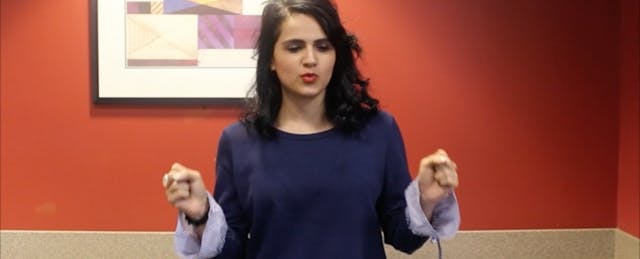If a student masters a subject such as English or Chemistry, then professors give them letter-grades for their transcripts indicating their level of mastery. But students learn much more than that at college, and some higher ed leaders are looking for ways to measure the other, softer skills student pick up while on campus.
But efforts to issue “badges,” or lightweight credentials for things like leadership and resilience, come with plenty of challenges, including convincing employers to take them seriously.
Today a nonprofit group called the Education Design Lab released a toolkit to help colleges set up badge-offering efforts, which it created in partnership with a dozen colleges and universities. As of today, the site gives eight examples of “21st-Century Skills Badges" offered by partners, including critical thinking, oral communication and intercultural fluency.
It costs nothing for colleges to participate in the partnership or use the resources, though its designers say they expect each college will want to customize or adapt the materials. The group also requires those who adapt its framework to follow a “usage agreement,” that includes a promise not to use it in a commercial offering.
Interest by colleges in badges and other microcredentials are growing, argues Kathleen deLaski, founder and president of the Education Design Lab. The group recently put out a call to other colleges to participate, and 115 organizations expressed interest, with about half of those saying they are strongly considering creating a badging system.
“Universities—particularly universities that serve non-elite students—are really looking for ways to help capture the parts of the liberal-arts degree that translate to the changing work economy,” deLaski continues.
Even so, the number of interested colleges is small when considering there are more than 4,000 accredited colleges in the U.S.
And while colleges may be attracted to badges, it is less clear whether employers will accept them, which will be crucial to their long-term success.
Alison Green, author of the book “Ask a Manager,” has been dismissive of the badge concept on her blog. “It’s yet another a silly idea from schools,” she argues. “Colleges keep doing this thing where they decide that they know better than employers do about what employers want to see from candidates, and then encourage students to use those ideas when applying for jobs… despite the fact that employers don’t want that stuff.”
deLaski stresses that her group worked closely with employers, consulting more than 50 of them and getting feedback on how to improve each badge they’re offering. And she said the next step is to run experiments to test how well these work in practice. The group plans to evaluate whether students with badges are more successful in the first year of their jobs than students without them. “We need those proof points,” she says.
For George Mason University, offering a badge on resilience is part of a broader university effort to be a “well-being university,” says Lewis E. Forrest, associate dean of University Life. “One of the pieces with that is helping students have lives of vitality and resilience,” he adds.
The university offers the badge through its career center. To earn one, students must complete a five-week non-credit workshop that mixes in-person and online instruction, and they have to complete an activity to demonstrate they understand the concepts successfully.
Forrest said that even if employers aren’t yet familiar with the badges, the students say they are learning and appreciate the workshop. “That’s really been a lot of the focus—what students are getting out if it,” he adds.
Officials at the Education Design Lab hope that by encouraging colleges to work in partnership and share information, they can keep badges from becoming a noisy and inconsistent space. “The concern of employers is there’s this kind of Tower of Babel,” says deLaski. “We’re trying to create consistency across sectors and schools.”
The other colleges working on the project are Andrews University, Aquinas College, Bay Path University, Boise State University, Georgetown University, Hope College, Makerere University, Michigan Colleges Alliance, Tunis Business School, University of Arizona, University of Virginia, and Vassar College.


